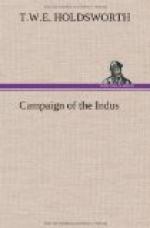We marched again on the 18th, another night march about twenty miles. Here we made another halt for three days, while some of the staff went on to get information of the country a-head, about which they were ignorant. All the villages we had passed through were deserted, and in some places the water was stinking. We looked back upon Sinde as a paradise compared to the country we were now in. All the little grain that was supplied to the bazaars by the commissariat was sold at the most exorbitant price, yet we were obliged to buy it, and as much as we could get of it too, and lucky we thought ourselves to get any of it, even at this rate, at times, in order to feed our horses and camels, which were beginning to knock up terribly. We could not now, as we used to do in Sinde, send the latter into the jungle to feed on the small brushwood, of which they were so fond, except at the risk of being robbed of them, and having the servants who looked after them murdered by the bands of Beloochees who hovered about us in every direction. Still, notwithstanding these annoyances, the humbugging system of conciliation was kept up, and although there was not an inhabitant to be seen, we were robbed to our faces very nearly; yet if a poor sub.’s horse or camel happened to break his ropes and strayed into a field he was immediately pounced upon by a provost-marshal and put into a sort of pound, from which he was not released except on the payment of a certain sum to be given to the owners of the field! Where were they to be found? The loss of camels now was irreparable; even if there were any to be sold, the prices asked were so exorbitant that few of us youngsters, hampered as we were, could afford to purchase; loss of camels produced loss of kit, loss of kit produced loss of health, &c. Yet during the whole of this march we were losing camels through robberies and fatigue, and no measures taken that we ever heard of to put a stop to it. We marched from this place on the 22nd, and came to a halt again at a place called Kotrie, close under the Hala mountains, about five miles from the Gundava Pass. Here we (i.e., our brigade and the 4th Light Dragoons) halted for a week. Sir J. Keane pushed on a-head with two troops of Light Cavalry and the left wing of the 19th Native Infantry, in order to catch up Sir Willoughby Cotton, who was marching in command of the main body of the Bengal division. General Willshire, with the staff, artillery, and cavalry, was at Gundava, about eight miles from us. At this place, Kotrie, which the inhabitants luckily had not deserted, we were better off in point of supplies than we had been since we left Larkhanu, and there was plenty of shooting and fishing; but it was without exception the hottest place I ever was in. Being close under a high range of mountains, we were perfectly screened from any cool breezes that might take it into their heads to blow from that quarter; add to this, the hills themselves, being composed of granite, or some stone




